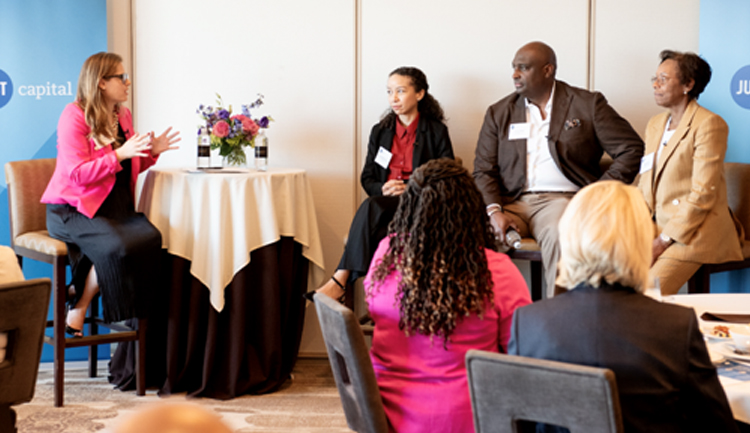Can “The Atlanta Way” Reinvigorate Corporate Community Investment?

How can corporations make a lasting difference to the financial, human, and social capital for all stakeholders? This was the question Roosevelt Giles, Chairman of the Stakeholder Impact Foundation, former Executive Chairman of Atlanta Life Financial Group, and JUST Capital Board member, put to a group of business leaders JUST Capital convened in Atlanta this week.
It’s a topic that doesn’t get the attention it deserves. Americans want companies to give more back to the cities and communities they do business in. Indeed, many corporations have a rich history of doing just that. Think of Rocket Mortgage in Detroit, Microsoft in Seattle, Prudential in Newark, Walmart in Bentonville. Investing in communities always features in our polling and is a core component of our Rankings.
Roosevelt’s question runs a little deeper though. It speaks to the obligations companies have to nurture strong economic and cultural bonds with the people and places they connect to; to invest in health, education, housing and infrastructure; to create good jobs. To be more just.
Those in attendance learned that despite the gleaming new office buildings in downtown Buckhead, economic mobility is low, deep inequality persists, and talent goes untapped. Rodney Bullard, CEO of The Same House and former executive at Chick-fil-A, put it this way; “In Atlanta if you were born in poverty, you have a 4.3% chance of getting out of poverty.”
Ashley Marchand Orme, JUST Capital’s Director of Equity Initiatives, challenged corporate board directors to act. “There’s an outsized impact corporations have on society. Corporations have to be engaged in finding solutions. In looking for ways to guide change, we should be able to turn to boards. Board directors have much longer tenure than CEOs when you think about it, they can guide change for the long-term in ways CEOs can’t. They can raise their hand and ask company leaders, ‘What are our biggest human capital and equity challenges? How can our company address those?'”
Overall, the panel assembled by JUST Capital – which in addition to Rodney featured Stephanie Martin from the Georgia Chamber of Commerce and JUST Capital’s Ashley Marchand Orme – stressed that business leadership was needed now more than ever. “It’s all about cities like Atlanta figuring out how to deepen relationships with CEOs. When the community does well, companies do better,” said one prominent guest.
With 17 Fortune 100 companies and a deep-rooted culture of philanthropy in the Greater Atlanta area, perhaps “the Atlanta way” of bringing private, public, and philanthropic leaders together can inspire a new model for community development.
